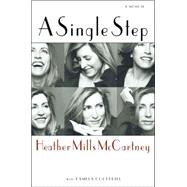When her left leg was amputated just below the knee in an accident with a police motorcycle in 1993, it would have been tragic under any circumstances but was doubly cruel for a professional model whose livelihood depended on her looks. But Heather Mills had come too far, and worked too hard, to let becoming an amputee wreck her life. Years of setbacks and traumas had given her the drive and determination needed to cope with this disaster too. Before she turned sixteen she had been arrested, run away from a broken home, joined a carnival, and held down a succession of menial jobs in London. Dealing with losing her leg was merely a new challenge for her.
In A SINGLE STEP Heather Mills McCartney speaks about her commit








